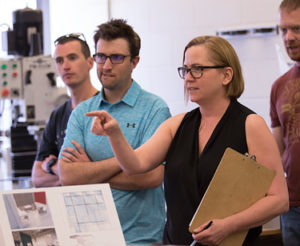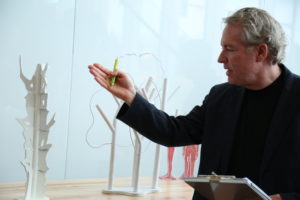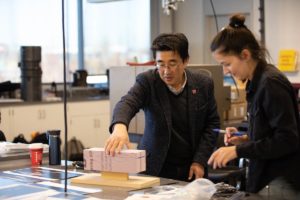Request Information
Ready to find out what MSU Denver can do for you? We’ve got you covered.
 The Industrial Design program focuses on teaching the skills, knowledge, and dispositions required to facilitate product design for manufacturing industries. An industrial designer typically creates new product ideas or re-designs existing products in a collaborative effort with marketing, engineering, and production teams. Designers create and develop product ideas and then communicate those ideas to clients and production entities through technical drawings, concept and final renderings, mock-ups, models and prototypes.
The Industrial Design program focuses on teaching the skills, knowledge, and dispositions required to facilitate product design for manufacturing industries. An industrial designer typically creates new product ideas or re-designs existing products in a collaborative effort with marketing, engineering, and production teams. Designers create and develop product ideas and then communicate those ideas to clients and production entities through technical drawings, concept and final renderings, mock-ups, models and prototypes.
 The curriculum at MSU Denver prepares students for professional design practice by teaching graphic and verbal presentation skills as well as hands on technical skills to enhance their innate creativity. Collaborative projects with other disciplines and industry partners are a vital part of the curriculum and typically occur in the design studio classes. Students also do a professional internship as their senior experience to further enhance the real world learning the department strives for. Students are required to pass through a portfolio review process at the end of the sophomore year to allow registration for upper division studio courses thus maintaining the quality of the program’s graduates. Graduates earn a Bachelor of Science degree. A minor in Industrial Design is also available.
The curriculum at MSU Denver prepares students for professional design practice by teaching graphic and verbal presentation skills as well as hands on technical skills to enhance their innate creativity. Collaborative projects with other disciplines and industry partners are a vital part of the curriculum and typically occur in the design studio classes. Students also do a professional internship as their senior experience to further enhance the real world learning the department strives for. Students are required to pass through a portfolio review process at the end of the sophomore year to allow registration for upper division studio courses thus maintaining the quality of the program’s graduates. Graduates earn a Bachelor of Science degree. A minor in Industrial Design is also available.
The Industrial Design B.S. is accredited by the National Association for Schools of Art and Design.

The primary purpose of schools of art and design is to help individual students turn talent, inspiration, creativity, and dedication into significant potential for service to the development of art and design culture in its multiple dimensions. Therefore, the focus of NASAD’s work is on issues of art and design content and educational substance as applied to the preparation and training of art and design professionals at the highest possible levels.
NASAD is the only accreditation that the Industrial Designers Society of America recognizes.

The department has an active student IDSA chapter and faculty involved in the national leadership of IDSA. Through this solid foundation of an accredited curriculum, and real-world learning opportunities, the program’s graduates are well equipped to meet the challenges of the competitive Industrial Design industry.
The mission of the Industrial Design Department is to provide a high quality experiential learning environment to produce graduates who are critical thinkers and innovative problem solvers with a refined sense of aesthetics, technology and culture.

The department collaborates with the professional community to augment the development of skills, knowledge and dispositions that enable graduates to immediately function as entry-level professional industrial designers.
The department goals to fulfill the mission are: